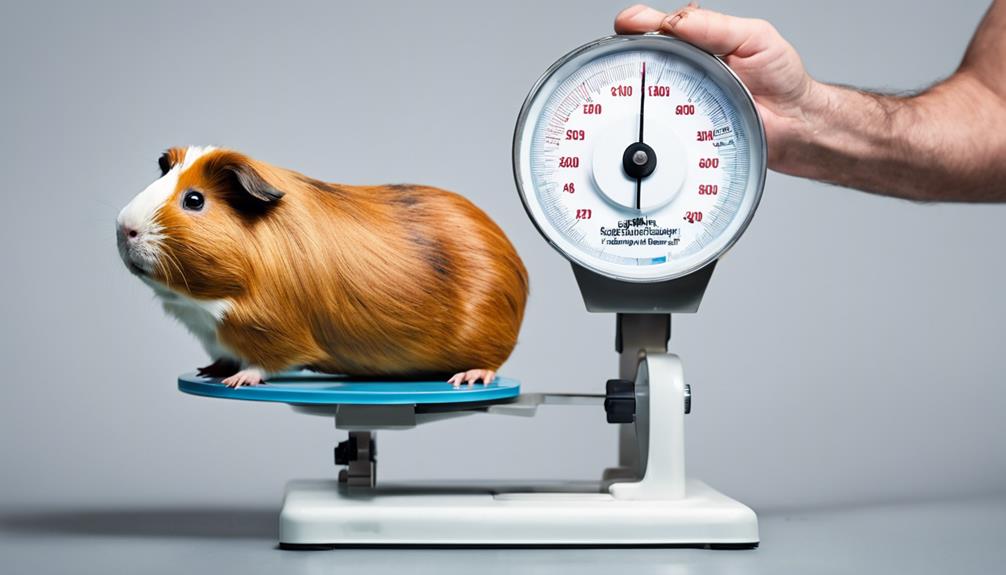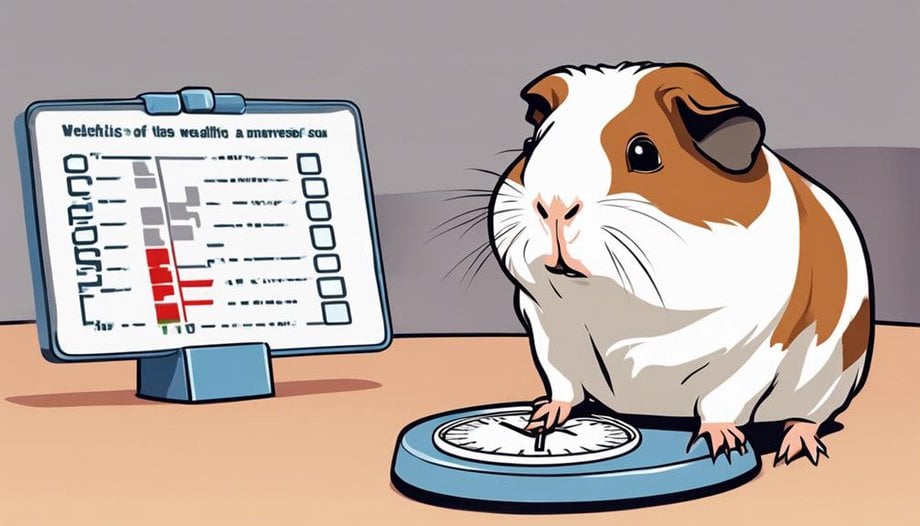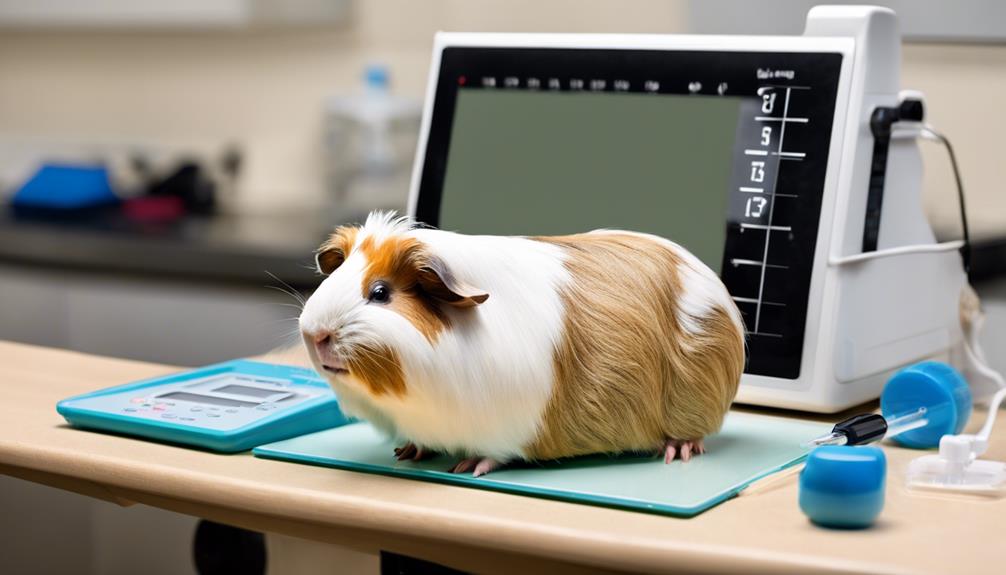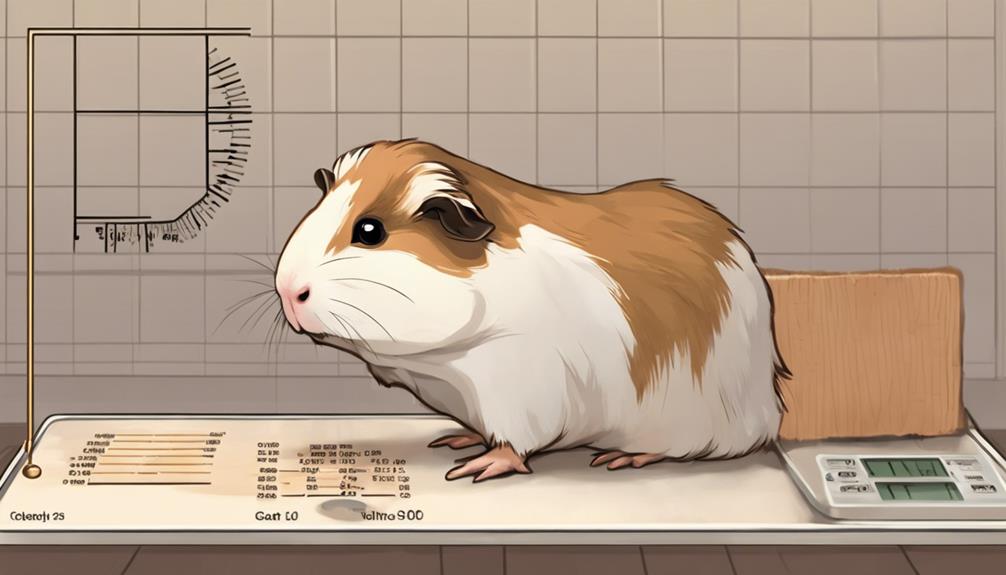Why Regular Weight Monitoring Is Important for Guinea Pig Health

Regular weight monitoring is crucial for maintaining the health of guinea pigs. By tracking their weight on a consistent basis, owners can quickly identify any fluctuations that may indicate underlying health issues. Sudden weight loss or gain can be early signs of illnesses such as dental problems, infections, or digestive issues. It is recommended to weigh guinea pigs at least once a week using a digital scale designed for small animals. This practice allows for prompt intervention and treatment if any health concerns are detected. Owners should also keep a record of their guinea pig's weight to monitor trends over time and share this information with a veterinarian during regular check-ups.
Guinea pigs have a sensitive digestive system and can develop serious health problems if not monitored closely. Weight loss, in particular, is a common symptom of various health issues in guinea pigs. By regularly weighing them, owners can catch potential problems early and seek veterinary care promptly. Additionally, maintaining a healthy weight is essential for guinea pigs' overall well-being and longevity. Along with a balanced diet and proper housing, regular weight monitoring is a key aspect of responsible guinea pig care. It is an easy and effective way to ensure that these small pets stay happy and healthy.
Key Takeaways
- Detect underlying health issues early through regular weight monitoring.
- Maintain overall well-being and longevity of guinea pigs.
- Adjust diet based on weight fluctuations for optimal health.
- Ensure prompt veterinary care by monitoring weight changes consistently.
Importance of Weight Monitoring
Regularly monitoring the weight of your guinea pig is an essential practice for ensuring their overall health and well-being. Weight tracking benefits guinea pigs by allowing early detection of any potential health issues. Through regular monitoring, owners can prevent complications that might arise due to fluctuations in weight. By keeping a close eye on your guinea pig's weight, you're actively contributing to their wellness and longevity.
Consistent weight tracking serves as a vital tool in the prevention of various health conditions. It provides valuable insights into the nutritional status and overall health of your pet. Monitoring weight regularly not only helps in early identification of any weight loss or gain but also aids in adjusting their diet accordingly. This proactive approach vital for your guinea pig maintains an ideal weight, which is vital for their vital health.
Weight Fluctuations in Guinea Pigs
Monitoring weight fluctuations in guinea pigs is essential for maintaining their health and well-being. Understanding their growth patterns and how seasonal changes can affect their weight is critical. Weight fluctuations in guinea pigs can indicate various health issues or changes in their diet and environment. Here are some key points to take into account:
- Seasonal Changes: Guinea pigs may gain a little weight during colder months due to less exercise and increased food consumption to stay warm.
- Growth Patterns: Young guinea pigs will naturally experience weight fluctuations as they go through growth spurts.
- Weight Loss: Sudden weight loss can be a sign of underlying health problems such as dental issues or infections.
- Muscle Gain: An increase in muscle mass can lead to weight fluctuations, especially in active guinea pigs.
- Behavioral Changes: Monitoring weight alongside behavior changes can provide insights into your guinea pig's overall well-being.
Early Detection of Health Issues

Vigilantly observing subtle changes in a guinea pig's behavior and physical condition can be a critical step in promptly identifying potential health issues. Early intervention plays a pivotal role in addressing health complications before they escalate. By staying attuned to weight trends and overall well-being, caregivers can detect anomalies early on and seek timely veterinary attention. This proactive approach not only aids in the prevention of serious illnesses but also enhances the quality of care provided to these beloved pets.
Guinea pigs are masters at masking discomfort, making it even more essential to be proactive in monitoring their health. Detecting subtle shifts in behavior, appetite, or energy levels can signal underlying issues that require attention. Whether it's a slight change in weight or a deviation from their usual habits, these indicators can be pivotal in ensuring the well-being of these small companions.
Through regular weight monitoring and a keen eye for changes, caregivers can practice preventative care that safeguards the health and happiness of their guinea pigs. Remember, early detection is key to addressing health concerns promptly and effectively.
Nutritional Needs and Weight Management
Guinea pigs have specific nutritional needs that require a delicate balance to maintain their health and weight. Ensuring they receive a well-rounded diet is essential for their overall well-being.
Monitoring their food intake daily can help prevent weight-related health issues.
Diet and Weight
To guarantee excellent health for guinea pigs, it's imperative to carefully manage their nutritional needs and weight. When it comes to diet and weight, here are some key points to take into account:
- Ensuring a well-balanced diet is essential for maintaining ideal weight and overall health.
- Monitoring food portions to prevent obesity and associated health issues.
- Providing fresh vegetables and fruits daily to meet their dietary requirements.
- Limiting sugary treats and fatty foods to prevent weight gain and digestive problems.
- Consulting with a veterinarian to create a personalized diet plan tailored to your guinea pig's specific needs.
Balanced Nutrition
Maintaining ideal health for guinea pigs hinges on the careful management of their nutritional needs, particularly in balancing their diet to support healthy weight management. Achieving nutritional balance through portion control and offering dietary variety is essential for keeping your guinea pig at an ideal weight. Ensuring they receive a mix of hay, fresh vegetables, pellets, and occasional fruits is key to meeting their dietary requirements. Below is a simple guide to help you understand the nutritional needs of your guinea pig:
| Nutritional Needs | Portion Control | Dietary Variety |
|---|---|---|
| High-Quality Hay | Unlimited | Different Types |
| Fresh Vegetables | 1 cup per day | Leafy Greens |
| Pellets | 1/8 cup per day | Fortified |
| Fruits | Occasional | Limited |
| Fresh Water | Always Available | – |
Monitoring Food Intake
Monitoring food intake is essential for ensuring the best nutritional balance and weight management in guinea pigs. Proper portion control and dietary habits play a critical role in maintaining their health.
To serve your furry friends better, consider the following emotional tips:
- Offer a Variety of Fresh Vegetables: Enrich their diet with colorful veggies for a joyful mealtime experience.
- Monitor Treat Intake: Limit sugary treats to prevent weight gain and promote overall well-being.
- Observe Eating Patterns: Understand their preferences and adjust their diet accordingly for the best health.
- Consult a Veterinarian: Seek professional advice if you notice any sudden weight loss to address potential health issues promptly.
- Share Mealtime Bonding: Enjoy feeding moments together to strengthen your bond and ensure their nutritional needs are met.
Impact of Obesity on Guinea Pig Health
Regularly overfeeding guinea pigs can profoundly impact their health and lead to obesity-related complications. Vital aspects of caring for these small pets include obesity prevention and weight management. When guinea pigs become overweight, they're at risk of various health problems.
Overweight guinea pigs may experience difficulties in grooming themselves, leading to skin issues and hygiene problems. Additionally, obesity can put strain on their joints, making movement uncomfortable and affecting their overall quality of life. Respiratory issues, such as labored breathing, can also arise in overweight guinea pigs, further diminishing their well-being.
To prevent these health risks, it's essential to monitor their weight regularly and adjust their diet and exercise accordingly. By maintaining a healthy weight through proper portion control and providing ample opportunities for physical activity, guinea pig owners can help their pets live longer, happier lives.
Monitoring Weight for Senior Guinea Pigs

An important aspect of senior guinea pig care revolves around vigilantly tracking their weight to safeguard their well-being in their advanced years. Senior care for guinea pigs requires special attention as they age, and weight monitoring plays a critical role in maintaining their health and detecting any potential issues early on. Here are some important points to contemplate:
- Senior care: As guinea pigs age, their nutritional needs change, making it essential to monitor their weight regularly to make sure they're receiving the appropriate diet.
- Weight loss: Sudden or unexplained weight loss in senior guinea pigs can be a sign of underlying health concerns that need to be addressed promptly.
- Health concerns: Senior guinea pigs are more prone to various health issues, and weight monitoring can help in identifying problems such as dental issues or digestive disorders.
- Weight gain: On the other hand, unexpected weight gain in senior guinea pigs can also indicate health problems like heart disease or hormonal imbalances.
- Early intervention: Regular weight monitoring allows for early intervention and tailored care to improve the quality of life for senior guinea pigs.
Tips for Accurate Weight Tracking
To ensure accurate weight tracking for guinea pigs, it's essential to master proper weighing techniques and maintain consistency in the frequency of weigh-ins.
By following these tips, guinea pig owners can effectively monitor their pets' health and quickly detect any fluctuations in weight that may indicate underlying health issues.
Proper Weighing Techniques
Effective weight monitoring in guinea pigs hinges on employing precise weighing techniques to guarantee accurate and reliable tracking of their health. Proper handling and accurate measurements are critical elements in ensuring the well-being of these small pets.
To achieve the most accurate weight measurements, consider the following tips:
- Make sure the guinea pig is calm and comfortable before weighing.
- Place the guinea pig gently on the scale without causing stress.
- Use a digital scale for precise readings.
- Weigh the guinea pig at the same time each day for consistency.
- Record the weight accurately to track any fluctuations over time.
Frequency of Weigh-Ins
For precise weight monitoring and accurate tracking of a guinea pig's health status, maintaining a consistent frequency of weigh-ins is paramount. Weigh-in consistency is key to tracking progress effectively.
By establishing regular weigh-in routines, guinea pig owners can identify weight trends and establish baselines for their pets. These regular checks not only help in detecting any sudden weight fluctuations but also provide valuable insights into the overall health and well-being of the guinea pig.
Consistent weigh-ins enable owners to address any potential health issues promptly, ensuring early intervention and treatment if necessary. Hence, making a habit of regular weigh-ins is a proactive approach that contributes significantly to the welfare of these small, beloved companions.
When to Seek Veterinary Advice

Seeking veterinary advice is essential when noticing any concerning changes in your guinea pig's health. Guinea pigs are delicate creatures, and prompt attention to any signs of distress can make a significant difference in their well-being. Here are five vital reasons to seek veterinary advice if you observe any worrisome changes in your guinea pig's health:
- Sudden Weight Loss: Rapid weight loss can indicate underlying health issues that require immediate veterinary attention.
- Decreased Appetite: A decreased appetite in guinea pigs can be a sign of various health problems and shouldn't be overlooked.
- Unusual Lethargy: If your guinea pig is unusually lethargic and lacking energy, it could be a sign of an underlying health issue.
- Breathing Difficulties: Labored breathing or wheezing should never be ignored as it may indicate respiratory problems.
- Abnormal Behavior: Any sudden changes in behavior such as increased aggression or unusual vocalizations should prompt a visit to the vet for a thorough examination.
Frequently Asked Questions
Can Guinea Pigs Still Be Healthy if They Are Slightly Under or Overweight?
While slight deviations in weight may not immediately harm guinea pigs, maintaining a healthy weight is important for their overall well-being. Dietary adjustments and exercise routines can help prevent health implications and improve longevity prospects.
Are There Specific Breeds of Guinea Pigs That Are More Prone to Weight Issues?
Certain guinea pig breeds, due to genetic predisposition, may be more prone to weight issues. Factors like dietary habits and exercise play a role in maintaining a healthy weight. Monitoring weight regularly can help identify and address potential concerns early.
How Often Should I Weigh My Guinea Pig to Track Their Weight Accurately?
Like a compass guiding a traveler through unknown lands, weighing a guinea pig every month exposes the subtle dance of weight fluctuations. This rhythm mirrors the age, dietary changes, and exercise habits of your pet.
Can Stress or Environmental Changes Affect a Guinea Pig's Weight?
Stress factors and sudden dietary changes can indeed affect a guinea pig's weight. These can impact their metabolism, leading to weight fluctuations. It's important to monitor these variables closely to guarantee your pet's health and well-being.
Are There Any Alternative Methods for Monitoring a Guinea Pig's Weight if a Scale Is Not Available?
In monitoring a guinea pig's weight without a scale, one can visually assess their body condition. Handheld devices like measuring tapes provide additional insights. Trend analysis and body condition scoring are valuable for tracking overall health.










